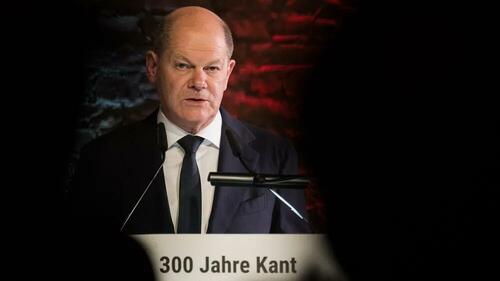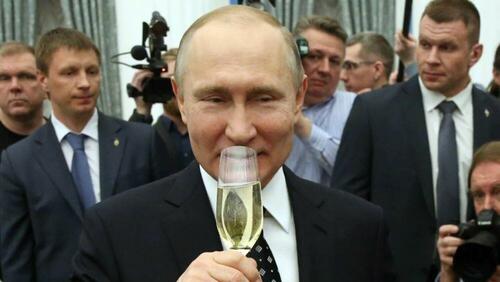
German Chancellor Olaf Scholz is quite upset, after Vladimir Putin quoted German philosopher Immanuel Kant - who the Russian president called "one of the greatest thinkers of both his time and ours," and said that the philosopher's call "to live by one's own wits" is relevant today.
"A country must live by its own wits… This does not mean that we do not care about the interests of others... but we will never allow Russia’s interests to be neglected. In some countries, among our neighbors, this thesis has been forgotten. Many live by someone else’s wits. This will not bring them any good," Putin told a group of college students in Kaliningrad - where Kant was born in 1724 (previously known as Königsberg, which belonged to the Kingdom of Prussia before becoming part of the Russian empire).
According to Scholz, "Putin doesn’t have the slightest right to quote Kant, yet Putin’s regime remains committed to poaching Kant and his work at almost any cost," he told an audience at the Berlin-Brandenburg Academy of Sciences, Die Zeit reports.
According to Scholz, the Russian invasion of Ukraine is not in alignment with Kant's teachings - noting that the philosopher spoke of the interference of states in the affairs of other nations. He also defended Ukraine's decision not to enter into peace talks with Moscow, and that 'forced treaties' could not achieve 'perpetual peace' - something Kant spoke of.
Putin has praised Kant over the years - suggesting in 2013 that he should be made an official symbol of the Kaliningrad Region.
Kaliningrad administrators hit back at Scholz' comments - saying in a Tuesday statement that nobody has done more than Russia to "perpetuate the memory of the great philosopher and his teachings," adding "Immanuel Kant died as a subject of the Russian crown. It seems to me that this, more than any words of all possible German politicians, shows the position of the great philosopher regarding Russia."
Kant was born in 1724 and died in 1804, and spent his entire life in Königsberg. During his later years, specifically from 1758 until his death, Königsberg and the entirety of East Prussia temporarily came under Russian control due to the events of the Seven Years' War (1756-1763). Although Prussia regained control over Königsberg after the war, Kant's status during those specific years was technically as a subject of the Russian Empire.
German Chancellor Olaf Scholz is quite upset, after Vladimir Putin quoted German philosopher Immanuel Kant – who the Russian president called “one of the greatest thinkers of both his time and ours,” and said that the philosopher’s call “to live by one’s own wits” is relevant today.
“A country must live by its own wits… This does not mean that we do not care about the interests of others… but we will never allow Russia’s interests to be neglected. In some countries, among our neighbors, this thesis has been forgotten. Many live by someone else’s wits. This will not bring them any good,” Putin told a group of college students in Kaliningrad – where Kant was born in 1724 (previously known as Königsberg, which belonged to the Kingdom of Prussia before becoming part of the Russian empire).
According to Scholz, “Putin doesn’t have the slightest right to quote Kant, yet Putin’s regime remains committed to poaching Kant and his work at almost any cost,” he told an audience at the Berlin-Brandenburg Academy of Sciences, Die Zeit reports.
According to Scholz, the Russian invasion of Ukraine is not in alignment with Kant’s teachings – noting that the philosopher spoke of the interference of states in the affairs of other nations. He also defended Ukraine’s decision not to enter into peace talks with Moscow, and that ‘forced treaties’ could not achieve ‘perpetual peace’ – something Kant spoke of.
Putin has praised Kant over the years – suggesting in 2013 that he should be made an official symbol of the Kaliningrad Region.
Kaliningrad administrators hit back at Scholz’ comments – saying in a Tuesday statement that nobody has done more than Russia to “perpetuate the memory of the great philosopher and his teachings,” adding “Immanuel Kant died as a subject of the Russian crown. It seems to me that this, more than any words of all possible German politicians, shows the position of the great philosopher regarding Russia.”
Kant was born in 1724 and died in 1804, and spent his entire life in Königsberg. During his later years, specifically from 1758 until his death, Königsberg and the entirety of East Prussia temporarily came under Russian control due to the events of the Seven Years’ War (1756-1763). Although Prussia regained control over Königsberg after the war, Kant’s status during those specific years was technically as a subject of the Russian Empire.
Loading…






